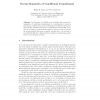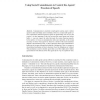129
click to vote
ACOM
2006
Springer
15 years 4 months ago
2006
Springer
Abstract. There are two main traditions in defining a semantics for agent communication languages, based either on mental attitudes or on social commitments. In this paper, we tran...
121
click to vote
ACOM
2006
Springer
15 years 8 months ago
2006
Springer
Interaction protocols enable agents to communicate with each other effectively. Whereas several approaches exist to specify interaction protocols, none of them has design tools th...
157
click to vote
ACOM
2006
Springer
15 years 8 months ago
2006
Springer
Abstract. This paper explores the use of temporal logics in the context of communication protocols for multiagent systems. We concentrate on frameworks where protocols are used to ...
122
click to vote
ACOM
2006
Springer
15 years 8 months ago
2006
Springer
Abstract. Lately, overhearing has gained interest in monitoring multi-agent settings. Previous investigations provided an extensive set of techniques using overhearing. However, mo...
224
click to vote
ACOM
2006
Springer
15 years 8 months ago
2006
Springer
Abstract. This paper considers the combination of agent communication and ontology alignment within a group of heterogeneous agents. The agents align their ontologies by constructi...
126
click to vote
ACOM
2006
Springer
15 years 8 months ago
2006
Springer
Abstract. In this paper, we identify some problems with current formalizations of conditional commitments, i.e. commitments to achieve a goal if some condition becomes true. We pre...
147
click to vote
ACOM
2006
Springer
15 years 8 months ago
2006
Springer
In this research, we re-arrange FIPA’s ACL performatives to form a subsumption lattice (ontology) and apply a theory of social commitments to achieve a simplified and observable...
126
click to vote
ACOM
2006
Springer
15 years 8 months ago
2006
Springer
Communication in multi-agent systems (MASs) is usually governed by agent communication languages (ACLs) and communication protocols carrying a clear cut semantics. With an increasi...
148
click to vote
ACOM
2006
Springer
15 years 8 months ago
2006
Springer
Communication is essential in multi-agent systems, since it allows agents to share knowledge and to coordinate. However, in open multi-agent systems, autonomous and heterogeneous a...
137
click to vote
ACOM
2006
Springer
15 years 8 months ago
2006
Springer
In this paper, we extend the classical BDI architecture for the treatment of social commitments based communication by: (1) linking social commitments and individual intentions, (2...


